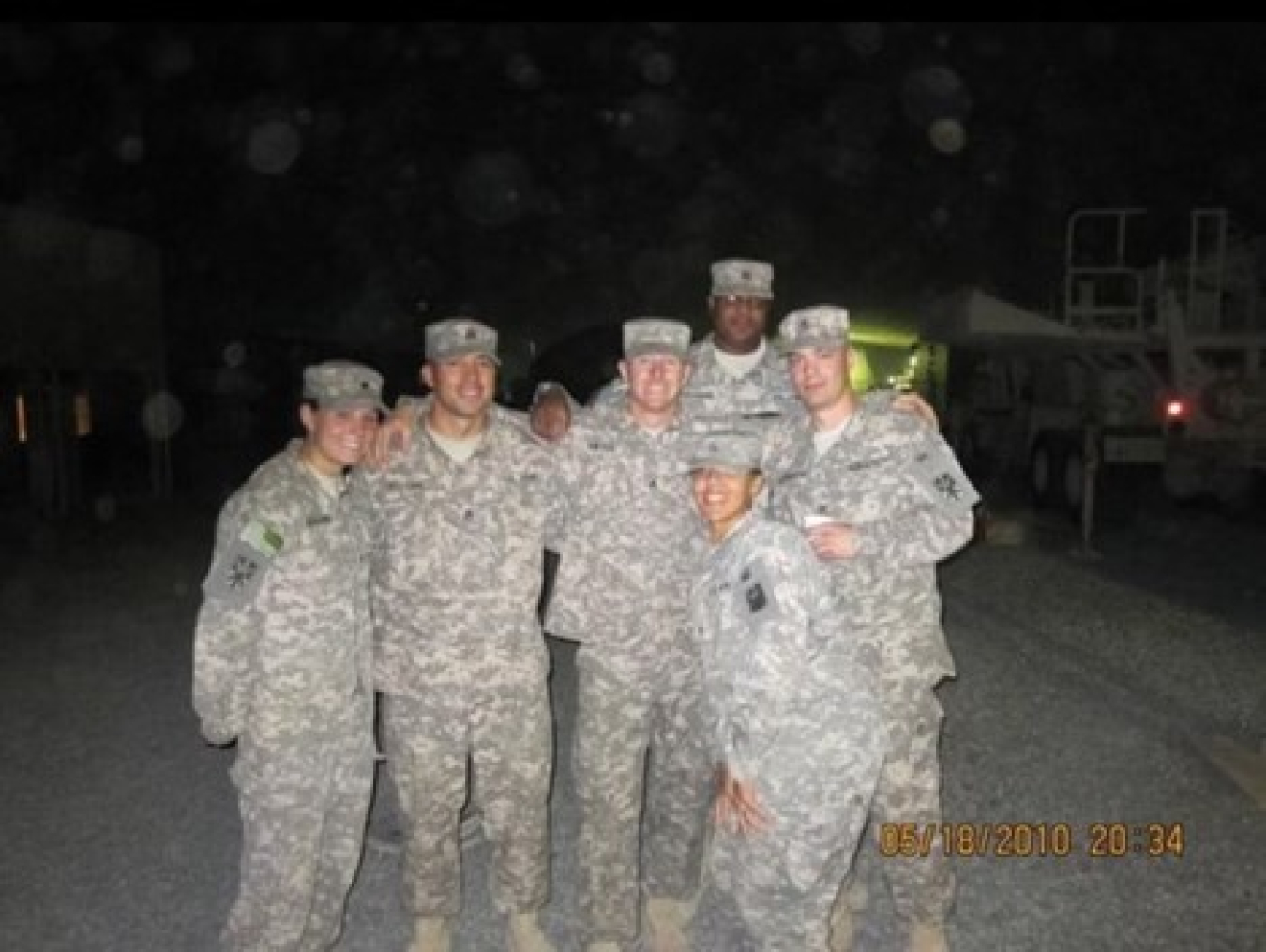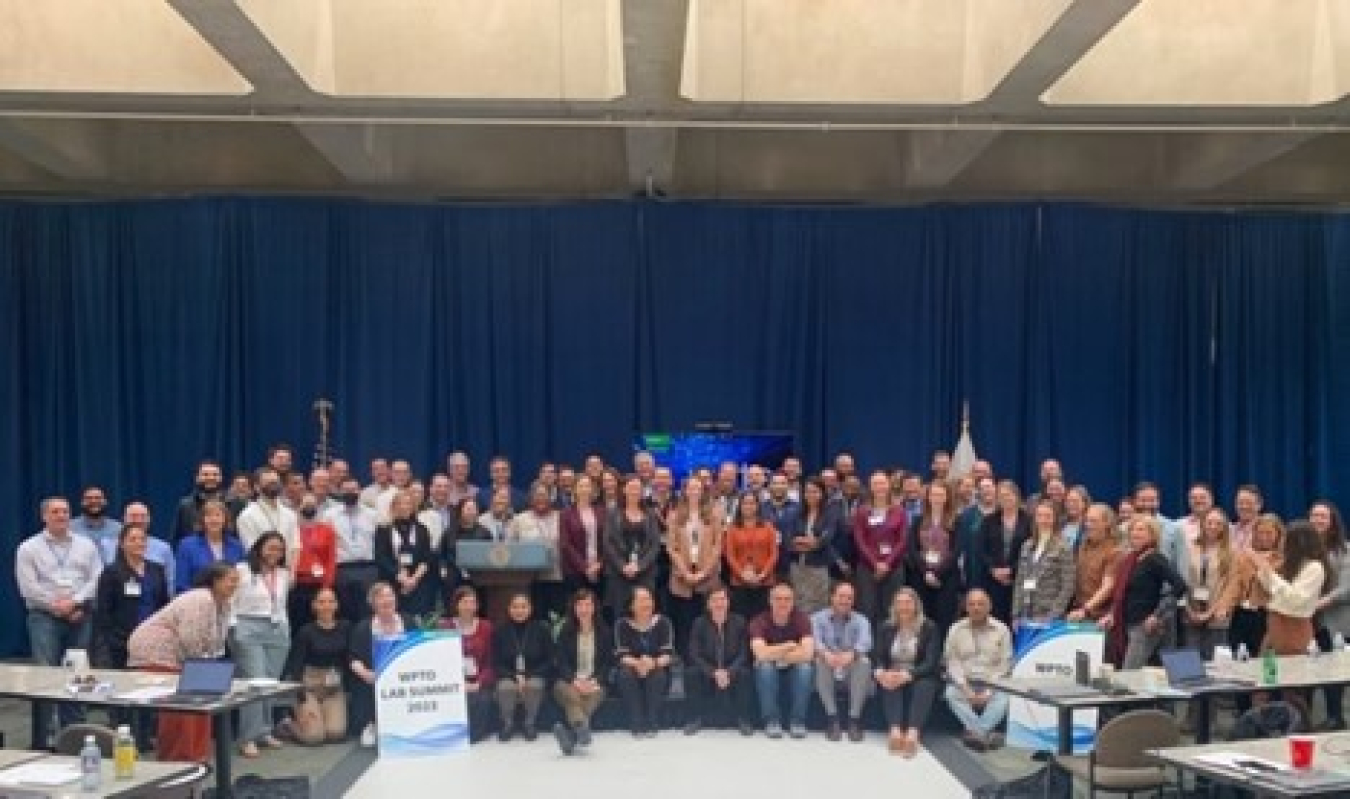Jen Trimble's desire to protect people and serve a bigger picture has led her from the U.S. Army to public works in Texas to her current role: operations manager for the U.S. Department of Energy's Water Power Technologies Office.
Hydropower and Hydrokinetic Office
January 9, 2024In 2005, Jen Trimble was deployed to Iraq for 15 months. She worked in operations logistics, shepherding supplies like food and medicine to military bases and Iraqi citizens alike.
"It opened my eyes," Trimble said. "It was humbling first. But second, it made me feel like there's a bigger picture. There are people who depend on you. They want your protection. The Army trains your mind to be at war. But sometimes, when you start to look at people, when you start to give back, you realize they’re depending on you. Your job matters."
Ripple Effect
WPTO's Ripple Effect series features individuals whose impactful work will help advance hydropower and marine energy technologies to achieve a clean energy future.
Trimble eventually left the Army, but that feeling—the desire to protect people and serve the bigger picture—stuck with her. At first, she wanted to become a psychologist. But, with her husband still active-duty military, she had to adapt to a nomadic life. Hopping from West Point in New York to public works in Texas to the U.S. Department of Defense in Washington, D.C., Trimble worked in many different roles. She was a financial tech, a budget analyst, a supervisory inventory manager, a management analyst, and more.
Now, back in Washington, D.C., Trimble has yet another title: operations manager for the U.S. Department of Energy's Water Power Technologies Office (WPTO). In some ways, water power brought her back to the "bigger picture."
"We're supporting the development of devices that, when a hurricane or natural disaster hits, can be deployed to make water for people to drink," Trimble said, referring to portable technologies that can turn seawater into drinking water using the power of ocean waves. "That's much bigger than us, right?" Trimble continued. "One day, we're going to change the world doing this."
Trimble shared her childhood career aspirations, what she was told to never say in an interview, and why minorities should give water power a second (or first) look.

Although Jen Trimble (leaning down in the front right) took a circuitous career path after she left the Army, she was always searching for a job that let her serve a "bigger picture." Photo courtesy of Jen Trimble
As a kid, did you show any specific career inclinations?
Um, no. I always said "I'm going to be a pediatrician! I'm going to be a nurse!" And then as I got older, I realized I did not like surgery or blood or even people as much as the profession requires.
So what got you on the path to public service?
I went to college for a couple years at Ohio State and ended up finishing my degree in the Army. I went active duty after two years and then majored in psychology. I was like, "OK, maybe I don't like people as much, but I can read people." My heart was set. When I got out of the Army, I was going to be a psychologist.
And yet, you're not a psychologist either!
My husband is active duty, so life took a spin for us. I started doing administrative work as a U.S. Department of Defense civilian, and they were like, "Hey, you should learn budget because budget is really cool." So, I did, quickly, and became financial management certified. And I was like, "Yeah, this is my thing."
What excites you the most about budget management?
In budget, you fund all these cool projects, but you never know what they are until you go out and see them. Even though my job doesn't have a direct effect, like a technical job, we support the jobs that do. We make sure that everything on the business side is functioning, so they can focus on the technical job. We all work together for the bigger piece.

If you often switch jobs or states, Trimble has some advice for you: "Don't discount any job. I try to take the positive from each." Photo courtesy of Jen Trimble
Which projects have you seen in action?
I got to go see the Waves to Water Prize finale in Nags Head, North Carolina, where teams competed to build wave energy-powered desalination systems. When I see the technology firsthand, hear passionate people talk about what they’re doing, and see that the doors are open, even for minorities, it makes me feel like this is the best job. Even though I don't have a technical background, being here has really opened my eyes. I'm preaching to my family about clean energy.
You have a long list of job titles behind you. What are the upsides and downsides of accruing so many different skills and moving jobs so often?
Part of being in a military family is that we are pretty agile. We move constantly. Every time, I have to compete for a new job, right? I remember in my first interviews, I used to say, "I was active duty, and I started off as just a secretary." One leader said, "Don't say just a secretary. You, as a secretary, you matter. You changed lives. Don't discount where you were in life."
That sticks with me to this day. You always have stepping stones. Don't discount any job. I try to take the positive from each. The downside is that you have to leave people who become family. WPTO has a great team. We all get along. It's pretty fun.
While you're still with your WPTO family, what does a typical day look like?
If you ever walked outside and you saw a trash can on fire, I would be the person throwing little cups of water on it. My day-to-day ranges from budget to building space, logistics, timesheets, anything that’s on the business side. We handle anything HR or budget related.
What have you learned about water power that you think other people should know?
Everything has been eye-opening. Like, how we could bring water power to lower-income communities, which might never know about water power or even jobs like mine. I hire all the interns, so I've made it a top priority to find people, like accountants and operations people, to show them the other side of science, technology, engineering, and mathematics (or STEM). Typically, we don't see a space for us in areas like water power. It's just engineers and scientists. But there is a world and a voice for us inside this community. And the more we know, the more we'll preach. And then the more everyone will know, right?

One of Trimble's goals is to encourage underrepresented minorities to consider a career in water power—or science, technology, engineering, and mathematics. "There is a world and a voice for us inside this community," Trimble said. Photo provided
In an ideal world, what would you most hope to accomplish? What kind of change would you most hope to affect?
I hope to get more people to consider government jobs. People talk about how you could make two times as much money if you take a civilian job. But sometimes it's more about your family and what means most. If I can go to bed at night thinking, "This job fulfills me, and it helps me be a mother to my children and a wife to my husband," that's the trifecta for me. I am fulfilled every day when I wake up.
What advice would you give to those folks who you're trying to reach and might be interested in this world but not really know how to enter it?
It can be intimidating to work with researchers. Sometimes, they'll say things you don't know, like in Charlie Brown when the adults go "wah, wah, wah." And you're like, "What are they talking about?" But I'll say, "What does that mean? Explain it to me." And they break it down for me, just like if I started speaking budget to them. They're just as intimidated. So, my biggest advice is: Don't be intimidated. Take the leap. Because we're all here together.
Catch up on WPTO's other Ripple Effect profiles and the Office of Energy Efficiency and Renewable Energy's Clean Energy Champions.
And stay in the know with WPTO! Receive the latest information on funding opportunities, events, and other news by subscribing to the Hydro Headlines newsletter, as well as the Water Column and comprehensive Water Wire newsletters.

